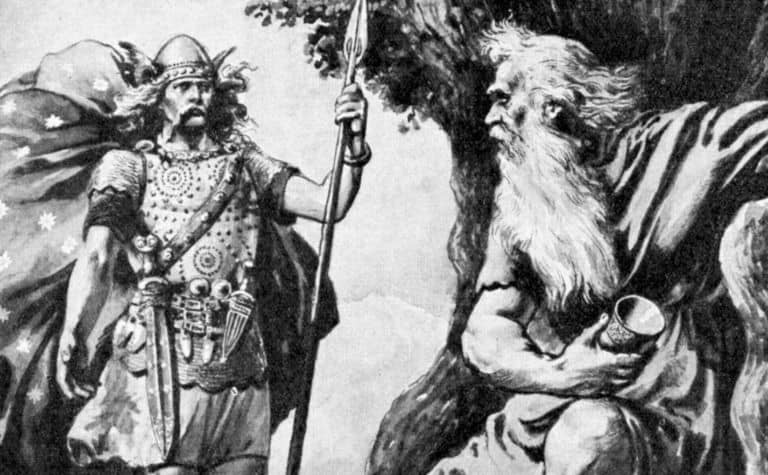The words Norse, Nordic, and Norwegian are similar and have overlapping meanings, but there are differences between them.
Many people associate them with Northern Europe and the region of Scandinavia but aren’t sure how they are alike and how they aren’t.
In general, when used as an adjective “Norse” often refers to Scandinavia, “Nordic” to northern Europe, including Scandinavia, and “Norwegian” to Norway.
When used as a noun, “Norse” often refers to Scandinavian languages, “Nordic” to people, and “Norwegian” to people or languages.
Understanding the difference between these words can help someone better understand the intent of a writer or speaker, and also use the words properly themselves. Keep reading to learn more.
Reindeer are plentiful in Norway. See What are Reindeer Used for in Norway? to learn more.

Norse, Nordic, Norwegian: Comparison
The common definitions for each term are not exactly the same and neither is their etymology or word history. Sometimes the words Norse, Nordic, and Norwegian are used in synonymous ways, but other times, even in their common use, they are not interchangeable.
| Norse | Nordic | Norwegian | |
| Adjective [1] | of or relating to ancient Scandinavia or the language of its inhabitants | 1. of or relating to the Germanic peoples of northern Europe and especially of Scandinavia, 2.of or relating to a group or physical type of the Caucasian race characterized by tall stature, long head, light skin and hair, and blue eyes belonging to or relating to Norway, its people, or its language | 1. Norwegian, 2nd use, 2. any of the western Scandinavian dialects or languages, 3. the Scandinavian group of Germanic languages |
| Noun [1] [2] | 1. a native of northern Europe, 2. a person of Nordic physical type, 3. a member of the peoples of Scandinavia | a native of Scandinavia, Finland, or Iceland. | 1. a native or inhabitant of Norway, 2. the Germanic language of the Norwegian people |
| word history [3] | obsolete Dutch | French | Medieval Latin |
| common uses | Norse paganism – name for a branch of Germanic religion; Norsemen – any of the ancient Scandinavians | Nordic countries – often Norway, Sweden, and Denmark, sometimes includes Finland, Iceland, and The Faroe Islands; Nordic folklore – stories and legends of Northern Europe; Nordic race – refers to winter sports, often types of ski races | Norwegian language, people or culture; Norwegian Cruise Line or Airline; Norwegian Sea |
| common synonyms or near synonyms | Scandinavian, Northmen, norse | norse, norden, north | Norwayan, Nordemenn, Northman, Norsemen, Vikings |
| sentence example [4] | Odin is one of the principal gods in Norse mythology. | The Nordic combined is a separate test consisting of a 10-km cross-country race and special ski-jumping contest. | The roots of Norwegian literature reach back more than 1,000 years into the pagan Norse past. |
Norwegians have interesting customs. See Every Wonder Why Norwegian Houses Are Red? Here’s Why to learn more.

Examples of Norse, Nordic, and Norwegian
Seeing examples of how each word is used in common English provides insight into how to use each term properly when spoken or written.
“Norse” in common language
- ‘Many of the events are legendary and bear similarities to other Germanic historical and mythological literature in Old English, Norse and German.’
- ‘Borrowings from Gaelic, Norse, and Norman French have created a diverse patchwork of regional dialects.’
- ‘The inscriptions are in runes and Old Norse, but the personal names (both Norse and Celtic) and the grammatically-confused language suggest a thoroughly mixed community.’
- ‘There appear to have been no contact languages or code-mixing between Celtic and Anglo-Saxon through which infiltration could occur, as happened later with Norse and with Norman French.’
- ‘Anglo-Saxon, the language of government in England, co-existed with Welsh, Cornish, Norse, Cumbric, and Gaelic – none Romance languages.’
Norway has a fascinating history. See Norway in World War 2: Interesting Facts to learn more.

“Nordic” in common language
- ‘The five Nordic countries of Denmark, Finland, Iceland, Norway, and Sweden together constitute Scandinavia.’
- ‘The Nordic working culture is of highly educated staff, of staff councils and youth programmes, of appointing women into senior positions and of long-term planning.’
- ‘Outside the black plastic tunnels the sun is bright, and the breeze is bracing and Nordic.’
- ‘Iceland isn’t the only place to revel in Nordic madness.’
- ‘Growth has been especially strong in the UK and the Nordic region.’
“Norwegian” in common language
- ‘The trick for me has been to attempt to absorb Norway, not to be negative, to identify with Norwegians and Norway, yet not lose my Irish roots.’
- ‘In a few days Norway and Norwegians all over the World will celebrate the 17th of May.’
- ‘Every 17th of May you will see Norwegians at their rowdiest and drunkest for their National Day celebrations.’
- ‘The national stadium, which will house 6,000 Norwegians on Saturday, was sold out last Wednesday.’
- ‘Each year the Norwegians observe the 17th of May as their National Day, celebrating independence.’
Related Scandinavian words and terms
A related-words vocabulary tool gives examples of related words for Norse, Nordic, and Norwegian, which shows their overlapping meaning as well as some uniqueness as well. [7]
The lists below reveal that the words Norse and Nordic have broader uses than the word Norwegian. It also shows that the word Norse relates more closely to things and Nordic more closely to people.
Norse:
- northman
- norwegian
- nordic
- norseman
- Scandinavian
- North Germanic
- North Germanic Language
- Scandinavian Language
Nordic:
- Scandinavian
- norse
- blond
- blonde
- light-haired
- North Germanic
- North Germanic Language
- Scandinavian Language
Norwegian:
- norse
- norseman
Norway has an interesting religious history. See the article Norse Mythology vs Christianity to learn more.
Norse, Nordic, and Norwegian in British English
“Norse” in British English
ADJECTIVE
1. of, relating to, or characteristic of ancient and medieval Scandinavia or its inhabitants
2. of, relating to, or characteristic of Norway
NOUN
1. the N group of Germanic languages, spoken in Scandinavia; Scandinavian
2. any one of these languages, esp in their ancient or medieval forms See also Proto-Norse, Old Norse
“Nordic” in British English
ADJECTIVE
of, relating to, or belonging to a subdivision of the Caucasoid race typified by the tall blond blue-eyed long-headed inhabitants of N Britain, Scandinavia, N Germany, and the Netherlands
“Norwegian” in British English
ADJECTIVE
1. of, relating to, or characteristic of Norway, its language, or its people
NOUN
2. any of the various North Germanic languages of Norway See also Nynorsk, Bokmål, Compare Norse
3. a native, citizen, or inhabitant of Norway
Etymologies of Norse, Nordic, and Norwegian
Etymology is the study of the origin of words and the way in which their meanings have changed throughout history. Knowing a word’s history helps a person understand how it’s unique.
The words Norse, Nordic, and Norwegian have unique etymologies, though they are related.
“Norse”: word history
Norse dates back to the 1590s. It comes from the term “a Norwegian,” via obsolete Dutch Noorsch. “Norwegian” is a reduced form of noordsch, meaning “northern, nordic” from noord, meaning “north.”
Also, in some cases, “norse” was borrowed from cognate Danish or Norwegian norsk.
The word also has influence from a language of the north, spoken and written in Norway, Iceland, etc., from 1680s.
It has use in Old Norse since 1844. An Old English word for “a Norwegian” was Norðman, which has been used as an adjective since 1768.
In Old French, Norois as a noun, meaning “a Norse, Norseman,” as well as “action worth of a man from the North (i.e. usually considered as deceitful.”
As an adjective it meant “northern, Norse, Norwegian,” and also “proud, fierce, fiery, strong.”
“Nordic”: word history
Nordic means “of or pertaining to the Scandinavian people or their languages or physical type.” It dates back to 1898 when it was associated with French nordique (in anthropologist Joseph Deniker’s system of race classifications), literally “of or pertaining to the north,” from nord meaning “north” (a loan-word from Old English).
Nordic was perhaps influenced by German Nordisch. It has been used as a noun from 1901.
It referred strictly, the blond peoples who inhabit Scandinavia and the north of Britain. As a type of skiing competition, it has been in use since 1949.
“Norwegian”: word history
Norewgian dates back to around 1600 as a noun when it referred to “a native of Norway,” and as an adjective, “of or pertaining to Norway.”
In early use, it was sometimes Norvegian, from Medieval Latin Norvegia, meaning “Norway” from Old Norse Norvegr + -ian.
Earlier words included Noreine and Norreis, which date to the 14th century, from Norrene when used as a noun. “Norway” (c. 1200; the surname Norne is from late 12c.), Noregan (late 14c., from Medieval Latin), and Norenish (c. 1200, adj. and n.) are from late Old English Norren, from Old Norse Norrœnn. [3]
References
[1] Source
[2] Source
[3] Source
[4] Source
[5] Source
[6] Source
[7] Source
